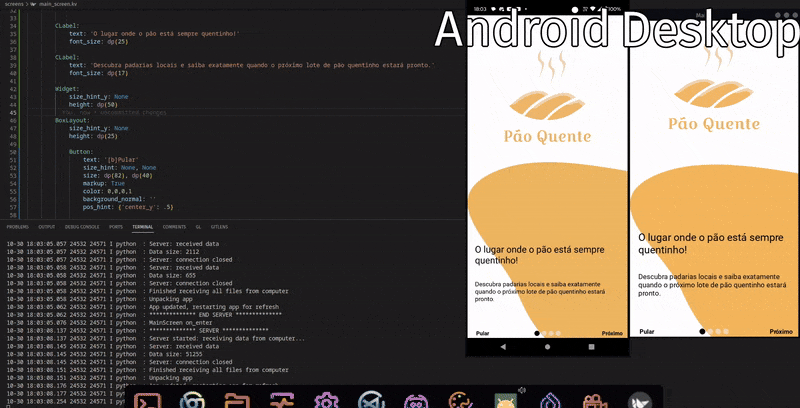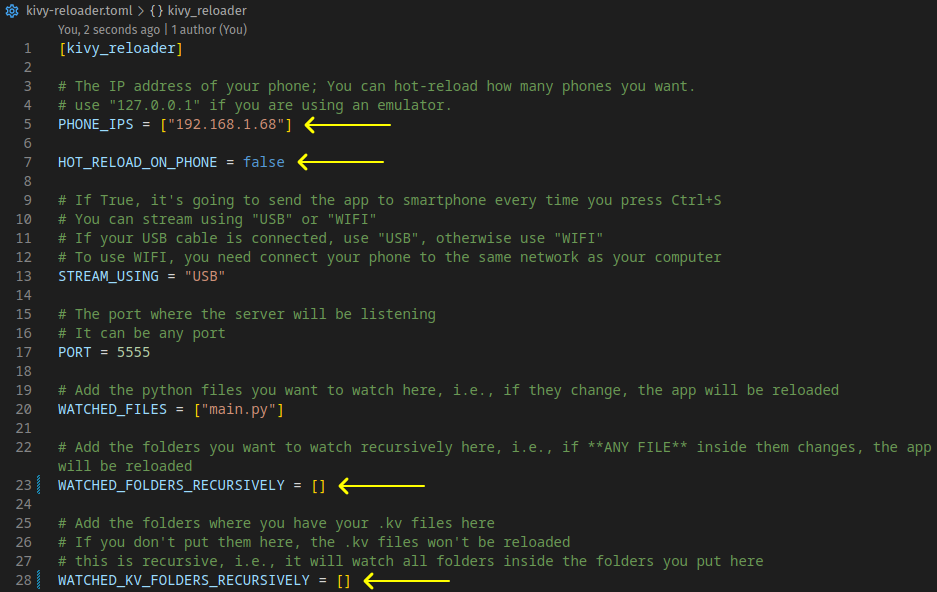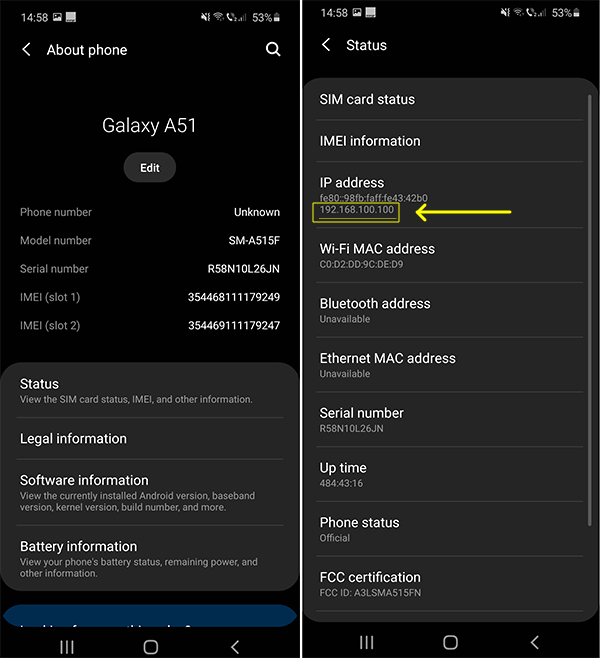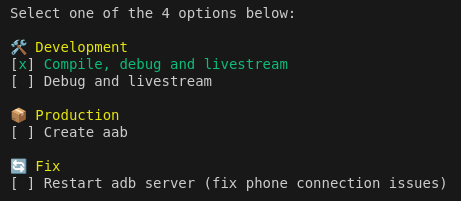Hot reload your Kivy app on multiple Android phones and computer in real-time.
Project description
Kivy Reloader
Hot reload your Kivy app on multiple Android phones, emulators and computer at the same time, in real-time.
This tool allows you to instantly update your Kivy app on multiple devices simultaneously by pressing Ctrl + S, without having to restart / recompile every time you make a change, saving your precious development time and effort.
Check out the Kivy School tutorial to learn how to use this tool, or follow the documentation below.
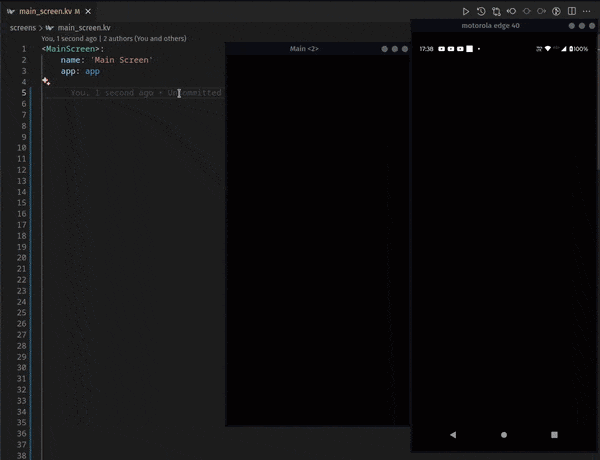
I am too impatient to read the tutorial, I want to see it working RIGHT NOW!
Clone this project, open the folder on terminal and type:
git clone https://github.com/kivy-school/kivy-reloadercd kivy-reloaderpoetry shellpoetry install- Update the
kivy-reloader.tomlfile with your phone IP and make sureHOT_RELOAD_ON_PHONEis set totrue. adb install bin/kivy_super_reloader-0.1-armeabi-v7a_arm64-v8a-debug.apkpython main.py
Keep calm and enjoy the Kivy Reloader! 😄
Prerequisites
You must have followed our installation guide and you must have the basic tools installed and know how to use them:
-
Poetry
-
Pyenv
-
Git
-
Scrcpy
Install Scrcpy
You must install
scrcpyon your computer. It comes with adb, so you don't need to install it separately.
How it works
Kivy Reloader is using Kaki under the hood, which uses watchdog to watch for file changes.
You configure on kivy-reloader.toml the folders / files you want to watch for changes.
When a change is detected on any of these files or folders, Kivy Reloader updates and reloads your app on all the devices you have configured (they need to be connected to the same network).
How to setup
I recommend you to use poetry to install kivy-reloader.
1. Start the Poetry Wizard
Start a poetry project with the following command and follow the wizard instructions.
poetry init
After the wizard is finished, the pyproject.toml file will be created in the project directory.
2. Activate the virtual environment
Type poetry shell on the terminal and press enter.
poetry shell
3. Install the dependencies
Install the dependencies by typing poetry add kivy-reloader on the terminal and press enter.
poetry add kivy-reloader
Configure Kivy Reloader
After installing kivy-reloader, on the project folder, type on the terminal kivy-reloader init.
kivy-reloader init
This is going to create two files on your project folder: kivy-reloader.toml and buildozer.spec.
The first time you run kivy-reloader init, you will see on the terminal:
This is the kivy-reloader.toml file that has been created on your project folder.
Configure the kivy-reloader.toml file:
Every line has an explanation above. The most important constants on this file are:
- PHONE_IPS: Put the IP of your phone here.
You can find the IP of your Android phone on: Settings > About phone > Status > IP Address.
- HOT_RELOAD_ON_PHONE: Set it to
trueto hot heload on your phone when you pressCtrl+S - WATCHED_FOLDERS_RECURSIVELY: This is a list of folder names, for example
["screens", "components"]. If any file inside these folders change, your Kivy app will reload. - WATCHED_KV_FOLDERS_RECURSIVELY: This is a list of folder names, for example
["screens", "components"]. This is where the Reloader will find your.kvfiles to reload them every time you pressCtrl+S.
The kivy-reloader init also creates a file called buildozer.spec on your project folder. It has the minimal buildozer.spec that you can use to make your app work with Kivy Reloader.
How to use
Instead of importing from kivy.app, import from kivy_reloader.app.
Start the app within an async event loop using trio.
On this tutorial we are going to show 3 possible different structures of your beautiful app.
Beautiful App structure 0 (beginner example):
If you are a super beginner in Kivy and just want to have a single file with a Kivy app.
├── main.py
Create a file main.py and paste this code:
import trio
from kivy.lang import Builder
from kivy_reloader.app import App
kv = """
Button:
text: "Hello World"
"""
class MainApp(App):
def build(self):
return Builder.load_string(kv)
app = MainApp()
trio.run(app.async_run, "trio")
Beautiful App structure 1 (intermediate example):
-
Create a file called
main.pyand a folder calledscreens. -
Inside the
screensfolder, create two files:main_screen.kvandmain_screen.py.
.
├── main.py
└── screens
├── main_screen.kv
└── main_screen.py
main.py
import trio
from kivy_reloader.app import App
class MainApp(App):
def build(self):
from screens.main_screen import MainScreen
return MainScreen(name="Main Screen")
app = MainApp()
trio.run(app.async_run, "trio")
screens/main_screen.kv
<MainScreen>:
name: "Main Screen"
app: app
BoxLayout:
orientation: "vertical"
Button:
text: "Welcome to Kivy Reloader!"
screens/main_screen.py
import os
from kivy.uix.screenmanager import Screen
from kivy_reloader.utils import load_kv_path
main_screen_kv = os.path.join("screens", "main_screen.kv")
load_kv_path(main_screen_kv)
class MainScreen(Screen):
def on_enter(self, *args):
print("MainScreen on_enter")
Beautiful App structure 2 (advanced example):
This is the recommended way of structuring your app.
- Create a file called
main.pyand a folder calledbeautifulapp. - Inside the
beautifulappfolder, create a file called__init__.py. - Inside the
beautifulappfolder, create a folder calledscreens. - Inside the
screensfolder, create two files:main_screen.kvandmain_screen.py.
.
├── beautifulapp
│ ├── __init__.py
│ └── screens
│ ├── main_screen.kv
│ └── main_screen.py
├── main.py
main.py:
import trio
from beautifulapp import app
trio.run(app.async_run, "trio")
beautifulapp/__init__.py:
from kivy_reloader.app import App
class MainApp(App):
def build(self):
from .screens.main_screen import MainScreen
return MainScreen(name="Main Screen")
app = MainApp()
beautifulapp/screens/main_screen.kv
<MainScreen>:
name: "Main Screen"
app: app
BoxLayout:
orientation: "vertical"
Button:
text: "Welcome to Kivy Reloader!"
beautifulapp/screens/main_screen.py
import os
from kivy.uix.screenmanager import Screen
from kivy_reloader.utils import load_kv_path
main_screen_kv = os.path.join("beautifulapp", "screens", "main_screen.kv")
load_kv_path(main_screen_kv)
class MainScreen(Screen):
def on_enter(self, *args):
print("MainScreen on_enter")
Run your app
Type python main.py on the terminal and your app will start. You can see the logs on the terminal.
When you change any file (from the watched folders you specified on the kivy-reloader.toml file), your app will reload.
How to compile and hot reload on Android:
- Connect your phone to the computer using a USB cable.
- Enable developer options and enable USB debugging on your phone.
- On the terminal, type
kivy-reloader run:
kivy-reloader run
This is a CLI application that will:
-
- Compile your app (generate
.apkfile) and deploy it on your phone.
- Compile your app (generate
-
- Start
scrcpyto mirror your phone screen on your computer and show the logs from your app on the terminal using logcat.
- Start
-
- Create a
.aabfile that will be used to deploy your app on Google Play Store.
- Create a
-
- Restart the adb server for you if needed.
You can easily control the CLI application using ↑ or ↓ arrows, and press ENTER ↵ or → to select the option you want.
- Choose the first option and Buildozer will compile the app (create a .apk file) and deploy it on your phone. Once the app is on your phone, run
python main.pyand the hot reload will be already working.
Just press Ctrl + S in any file inside screens folder or main.py and your app will be updated on computer and phone at the same time. (assuming you have configured the kivy-reloader.toml file correctly).
Contribution
If you have any idea or suggestion, please open an issue or a pull request.
Do you need help?
If you need help with Kivy Reloader, you can ask on Kivy Discord support channels. We'll be happy to help you.
Project details
Release history Release notifications | RSS feed
Download files
Download the file for your platform. If you're not sure which to choose, learn more about installing packages.
Source Distribution
Built Distribution
Hashes for kivy_reloader-0.3.3-py3-none-any.whl
| Algorithm | Hash digest | |
|---|---|---|
| SHA256 | 6016a47d501b44f0641ed8f0d1955efb7a566699908ef6592792ba9c70ea259c |
|
| MD5 | 30e85cd93c2237680e9280295be7b038 |
|
| BLAKE2b-256 | d77283a4590ccfc0729d8366cd2478d83979683333b1153ef9674667994042e9 |


